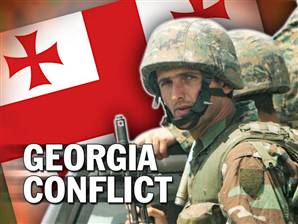EU observer mission set to start in Georgia on Wednesday
 Moscow/Tbilisi - The European Union observer mission was preparing to begin its operations in Georgia in the face of a Russian decision not to permit them to operate in Georgia's renegade provinces Abkhazia and South Ossetia despite an August promise seemingly allowing it.
Moscow/Tbilisi - The European Union observer mission was preparing to begin its operations in Georgia in the face of a Russian decision not to permit them to operate in Georgia's renegade provinces Abkhazia and South Ossetia despite an August promise seemingly allowing it.
"We are assuming that the Russians too will hold to the agreements," said a spokeswoman for the mission Tuesday in the Georgian capital Tbilisi.
The EU observer mission is formally to begin its work on Wednesday.
"We're starting tomorrow and we'll see then," the spokeswoman said.
Earlier Tuesday, a Russian army spokesman cited by the Interfax news agency said the EU observers taking up positions in the region to monitor a Russo-Georgian ceasefire agreement will have to remain in "security zones" between the two countries' forces, and Russian forces will not allow the EU monitors free movement through Russian- controlled territory.
The decision threw a monkey wrench into a ceasefire brokered by French President Nicolas Sarkozy during August's Russo-Georgian war.
According to the plan, EU observers would monitor both sides' adherence to the agreement, in part, by keeping tabs on force levels in the region - an almost impossible task if observers are not allowed into territory controlled by the Russian army.
All parties to the ceasefire agreement "had agreed to this," the Russian army official was reported to have claimed.
The Kremlin came into conflict with the international community in August and September after fighting stopped when Russian troops systematically destroyed much of Georgia's military infrastructure, citing a ceasefire term allowing them "to establish and maintain local security."
Javier Solana, the EU's top diplomat, was expected to arrive in Georgia later on Tuesday for meetings with Georgian President Mikheil Saakashvili and Foreign Minister Eka Tkeshelashvili.
His itinerary also included a visit to the Georgian city Gori, which was damaged by Russian bombardment during the active phase of the war.
Russia's rejection of a wide-ranging EU observer mission in the region was accompanied by an announcement Moscow would pull much of its diplomatic legation out of Georgia, making direct day-to-day negotiations between the two countries substantially more difficult.
Some 30 Russian diplomats were set to depart the Georgian capital Tbilisi on Tuesday, leaving behind a small caretaker team in the Russian embassy.
Russia recognized the independence of Abkhazia and South Ossetia at the end of August. Most of the international community has criticized the decision. (dpa)